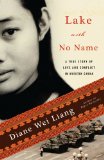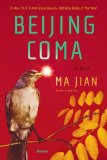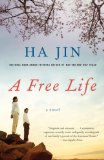Summary | Excerpt | Reviews | Beyond the book | Read-Alikes | Genres & Themes | Author Bio

 Book Reviewed by:
Book Reviewed by:
Marnie Colton
Buy This Book
I was nearly 14 the summer that the Chinese government quashed the student democracy movement centered in Beijing; I remember seeing media coverage of the tanks rolling into Tiananmen Square in June of 1989 and fearing the worst for the protesters, most of whom were only a few years older than me. But when I started high school in the fall, no one talked about what had happened, and I went on to form the same ideas of China’s government that most Westerners hold today: a repressive, secretive regime beginning to reap the benefits of capitalism and global production while keeping the majority of its citizens desperately poor and punishing anyone who dared to question its motives.
Diane Wei Liang’s memoir of growing up in China during the 1970s and '80s corroborates this damning portrayal of the government but also gives that time a human dimension often lacking in journalistic reports. Like the best nonfiction accounts of historical movements, Lake with No Name illuminates the political by approaching it from a personal perspective. While Liang shows us the Tiananmen Square revolt and the grassroots movement that led up to it, she also introduces us to fellow students, family members, and most poignantly, her friend Dong Yi, a key player in the political events of the day and a man with whom she shares a fraught relationship. Liang’s love for Dong Yi, complicated by personal developments in both their lives, functions as the memoir’s engine, the heart at its core that beats steadily even in the midst of social upheaval.
The first few chapters paint a vivid portrait of life during the Cultural Revolution, as Liang recounts how her middle-class, intellectual parents were forced to work at a labor camp as part of their Maoist "re-education." They were lucky; many intellectuals were imprisoned or killed during this time, and the government encouraged members of collectives and labor camps to snitch on those who questioned the movement or failed to show the appropriate patriotism. Liang herself describes the merciless bullying she faced from classmates who dubbed her "Little White Face," an insult directed at her bourgeois roots. All this came to an abrupt end however, with Mao’s death in 1976, an event that Liang records with understated grace: "The Cultural Revolution, which had ruined the lives of millions of Chinese for the past ten years, had finally ended."
 By the time Liang starts attending Beijing University in 1986, she has matured into a dedicated student earning top honors in psychology and ready to plunge into both love and the burgeoning democracy movement. The two pursuits dovetail when she meets Dong Yi, who introduces her to the democratic ideas that are increasingly popping up in salon discussions and dorm room chats. Liang centers her coming-of-age at the place that inspired the book’s title, the romantic Weiming Lake ("Lake With No Name") on campus where poets, revolutionaries, and lovers gather in a traditional Chinese setting to plan their country’s bold new future.
By the time Liang starts attending Beijing University in 1986, she has matured into a dedicated student earning top honors in psychology and ready to plunge into both love and the burgeoning democracy movement. The two pursuits dovetail when she meets Dong Yi, who introduces her to the democratic ideas that are increasingly popping up in salon discussions and dorm room chats. Liang centers her coming-of-age at the place that inspired the book’s title, the romantic Weiming Lake ("Lake With No Name") on campus where poets, revolutionaries, and lovers gather in a traditional Chinese setting to plan their country’s bold new future.
With the clarity that can only come after years of distance from an intense time and place in one’s life, Liang gradually builds an eyewitness account of the student democracy movement. From her initial involvement as an observer reading the pro-democracy posters displayed in the Square to her empathy with a group of hunger strikers to her participation in an effort to stop army tanks from moving onto the campus, she painstakingly shows the steps that led to the government’s inevitable crackdown on what it labeled an "anarchist" movement. When Liang passionately argues in favor of the students occupying Tiananmen Square despite the government’s edict that they leave, her boyfriend, an older professor, reminds her that the government "[won’t] care as much about saving face in front of TV cameras as letting their power be threatened." As Mao himself said, "Whoever has the guns, has the power," a statement that became horrifyingly true on June 4, 1989, when the army opened fire on its own citizens, killing thousands (between 2,600 and 3,600, according to the most reliable reports).
In the aftermath of this awfulness, Liang rebuilds her life in the United States, eventually earning degrees, marrying, and raising a family away from the country she loves but whose government she distrusts and fears. Although the alternating excitement and terror that have animated the book subside after the June 4 incident, Liang admirably maintains the story’s momentum as she relays the changes that she experienced in moving to the U.S. and reveals the outcome of her relationship with Dong Yi. This relationship runs like a current throughout the book, sometimes rocky, sometimes smooth, its fruitlessness most eloquently described shortly before the Tiananmen Square massacre: "Hope was leaving me, and it felt as if this death of hope would be a long and slow death. It felt the way the silk strands look when they are being drawn from the soaked cocoons of silkworms."
Such poetic reflection defines this moving memoir that deftly weaves the personal and political into a shining braid. Liang begins each chapter with an epigram from a Chinese poem, each chosen for its significance to the subject matter. For instance, Chapter 3, "Love," begins with this quotation from Xi Qi Yi, a 9th century writer: "Look for him a thousand times, turn around, he is standing alone below the hazy light." This captures the giddy wondrousness of first love, just as Li Bai’s 8th-century verse captures the sobering aftermath of the June 4 massacre: "Blood tinted the wild grass red; wolves were in high positions."
Although the Chinese government would probably consider Liang a dangerous and willful dissident (indeed, she chose not to dedicate the 2003 edition - published in the UK and Canada and maybe elsewhere, but not in the USA - of this book to her mother, for fear of repercussions), her enduring love for China manifests itself on every page. John Lydon of the ‘70s punk band the Sex Pistols once said that they created angry music not because they hated England but because they loved its people and despised how its government was treating them; in much the same way, Diane Wei Liang has written a lament for her homeland, one that teems with regret for what could have been.
About the Author
Diane Lei Wiang is also the author of the Mei Wang mystery series which starts
with
The Eye of Jade and continues with
Paper Butterfly. She lives in London with her husband and their
two children.
![]() This review
first ran in the August 12, 2009
issue of BookBrowse Recommends.
This review
first ran in the August 12, 2009
issue of BookBrowse Recommends.

If you liked Lake with No Name, try these:

by Ma Jian
Published 2009
At once a powerful allegory of a rising China, racked by contradictions, and a seminal examination of the Tiananmen Square protests, Beijing Coma is Ma Jian’s masterpiece. Spiked with dark wit, poetic beauty, and deep rage, this extraordinary novel confirms his place as one of the world’s most significant living writers.

by Ha Jin
Published 2009
A moving, realistic, but always hopeful narrative novel of the Wu family - father Nan, mother Pingping, and son Taotao - as they fully sever their ties with China in the aftermath of the 1989 Tiananmen Square massacre and begin a new, free life in the United States.





The Funeral Cryer by Wenyan Lu
Debut novelist Wenyan Lu brings us this witty yet profound story about one woman's midlife reawakening in contemporary rural China.
Your guide toexceptional books
BookBrowse seeks out and recommends the best in contemporary fiction and nonfiction—books that not only engage and entertain but also deepen our understanding of ourselves and the world around us.